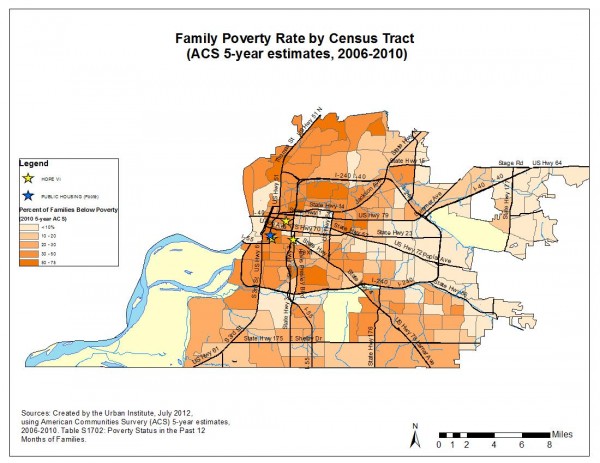Families in Memphis, a city marked by high poverty and unemployment, face significant barriers to living in safe and healthy communities.
Unemployment among those over 16 years old and in the labor force was at 14.9 percent in Memphis, compared with 11.3 percent in Tennessee and 9.7 nationally, according to the 2010 American Communities Survey (ACS). A stunning 39.9 percent of all Memphis children were living in households in poverty in 2010, compared with 25.7 percent statewide and 21.6 percent nationwide.
The concentration of poverty in certain geographic areas is also striking. Neighborhoods with the highest rates of family poverty (families living below the federal poverty level) cluster around current and former public housing developments.
Memphis Family Poverty Level
Concentrated poverty is harmful to many aspects of family life, contributing to poor mental and physical health, risky sexual behavior, delinquency, and increased exposure to violence. In public housing communities, where facing many of these challenges is the norm, residents often suffer some of poverty’s worst effects, such as drug addiction, arrest, incarceration, or severe trauma from the stress of coping with constant violence and disorder.
With changing demographics and the unprecedented hardship resulting from the Great Recession, cities like Memphis continue to wrestle with how best to support vulnerable families. Although housing redevelopment (including the HOPE VI grants) and programs to help residents move to better neighborhoods have shown some positive effects, these strategies did not measure up to the transformative effects anticipated. In my next post, I will explore promising responses to combatting concentrated poverty and its effects on life chances.
Tune in and subscribe today.
The Urban Institute podcast, Evidence in Action, inspires changemakers to lead with evidence and act with equity. Cohosted by Urban President Sarah Rosen Wartell and Executive Vice President Kimberlyn Leary, every episode features in-depth discussions with experts and leaders on topics ranging from how to advance equity, to designing innovative solutions that achieve community impact, to what it means to practice evidence-based leadership.
